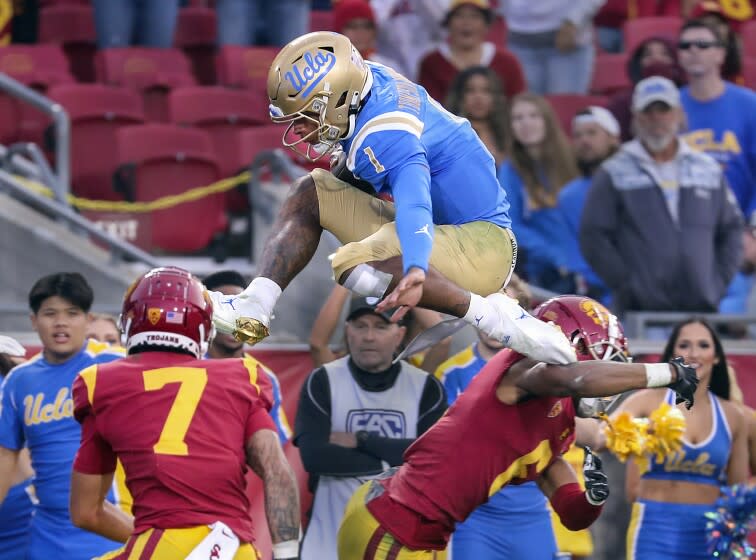UC to scrutinize UCLA's Pac-12 exit after Newsom and regents demand clarity on the deal

- Oops!Something went wrong.Please try again later.
The University of California announced Thursday it will scrutinize UCLA's Pac-12 exit and issue a public report on the effect on student-athletes and the ripple effect on UC Berkeley and other campuses.
The request for a review came from the UC Board of Regents and Gov. Gavin Newsom, who demanded an explanation from UCLA on its planned move in August 2024 after he attended a closed-door regents meeting Wednesday about the matter in San Francisco. He has expressed concern about what he views as a lack of transparency by UCLA, which informed UC President Michael V. Drake about its conversations with Big Ten officials but did not consult with regents. Only a handful of UC regents were notified just before the decision was announced.
UC Berkeley — the only UC campus that will be left behind in a weakened conference without UCLA and USC — will probably take a big financial hit.
"The first duty of every public university is to the people — especially students,” Newsom said in a statement. “UCLA must clearly explain to the public how this deal will improve the experience for all its student-athletes, will honor its century-old partnership with UC Berkeley, and will preserve the histories, rivalries, and traditions that enrich our communities.”
The decision by UCLA — along with USC — to leave the Pac-12 Conference for the Big Ten has left Cal and other remaining conference teams reeling over the threat of losing millions in media rights revenue, not to mention the holdovers’ viability as a major player in the rapidly shifting college sports landscape.
UCLA and UC Berkeley have declined to comment on the issue.
Drake's office will conduct and publicly present its findings and recommendations to the regents on or before Aug. 17.
The report will assess several major areas.
First, regents have asked for information on the effect of the Pac-12 move on UCLA and other UC campuses’ culture, operations and finances.
UCLA stands to gain big, touting its move to the Big Ten as a huge boost for its male and female athletes. In addition to the ability to compete for national titles across all sports and draw high-profile media exposure, the change in conferences will help secure the financial future of an athletic department facing an unprecedented $102.8-million deficit.
A new Big Ten media rights deal including USC and UCLA, which is expected to yield in excess of $1 billion, could more than double the yearly payout the Bruins would have received by remaining in the Pac-12. Also, the move spares UCLA from a doomsday scenario it potentially faced — the elimination of some Olympic sports teams — because of diminished resources.
But regents also want to know how other UC campuses will fare. UC Berkeley is bracing to lose millions in media revenue under a new TV contract in two years, which will probably be far less lucrative without USC and UCLA and the huge Southern California market.
While UCLA sees the Big Ten move as a way to protect its Olympic sports, Berkeley will have to search for new ways to do the same as its revenue from football and overall conference television media rights decline. It's unclear whether the Pac-12 could orchestrate a merger or partnership with the Big 12 or Atlantic Coast Conference that could soften that blow.
UCLA's move to the Big Ten could also affect other UC schools outside the Pac-12 — including Big West members Davis, Irvine, Riverside, Santa Barbara and San Diego. They often depend on the chance to schedule UCLA and USC to improve their standing, gain revenue off home attendance and limit nonconference competition travel costs. That probably would still be an option.
Regents also want to know the effects of the move on UCLA’s student-athletes, including how the campus plans to address issues related to travel, competition schedules and academic support.
As part of the Big Ten, UCLA student-athletes will play in the nation’s only conference spanning coast to coast, boosting recruiting efforts and enhancing their ability to secure lucrative name, image and likeness deals. But the longer travel distances and time zone differences could affect their health and academic achievement.
Finally, UC will examine the regents’ policy that allows each university to control its athletics operations, and offer recommendations on policy changes necessary to ensure "proper oversight of major athletics-related decisions."
Newsom and the Legislature have no authority to kill the UCLA deal, because the UC system is constitutionally autonomous. In 1991, the UC Office of the President delegated authority to campus chancellors to execute their own contracts, including intercollegiate athletic agreements.
But Board of Regents Chair Richard Leib told The Times on Wednesday that the delegation of authority "didn't necessarily anticipate this type of action."
“The Regents have had questions since this was announced, and this week’s meeting was our first chance to come together as a group and discuss our concerns," Leib said in a statement Thursday. "We appreciated hearing from the Governor, and share his passion for this topic. We look forward to acting on the recommendations that UCOP will bring forward by August 17th.”
This story originally appeared in Los Angeles Times.

